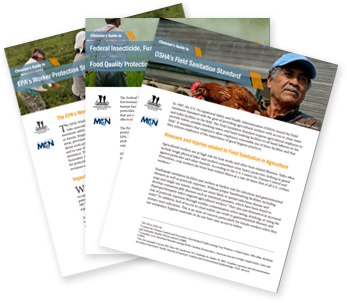This 90-minute webinar was created for physicians, nurses, and other health professionals who treat and case manage patients with active TB. The webinar introduced the 2016 Official American Thoracic Society/Centers for Disease Control and Prevention/Infectious Diseases Society of America Clinical Practice Guidelines: Treatment of Drug-Susceptible Tuberculosis. This training highlighted the guidelines development process, the key changes in recommendations, and discussed the evidence supporting the changes. The webinar was originally presented on November 4, 2016. This training was jointly sponsored by all 5 RTMCCs.

MCN and Farmworker Justice offer these guides to assist clinicians in understanding farmworker health and safety regulations. OSHA’s Field Sanitation Standard; EPA's Federal Insecticide, Fungicide, and Rodenticide Act (FIFRA); EPA's Food Quality Protection Act (FQPA); EPA’s Worker Protection Standard (WPS).
- OSHA's Field Sanitation Standard Clinician's Guide.pdf (747.53 KB)
- FIFRA FQPA Clinician Guide.pdf (287.9 KB)
- WPS Clinician's Guide.pdf (843.35 KB)
Este diccionario ilustrado bilingüe de MCN, "Seguridad en Palabras/ Safety in Words", muestra los peligros que hay en el lugar de trabajo y las mejores prácticas para la salud y la seguridad en la agricultura. Desarrollado con el apoyo del Programa de Subvenciones Susan Harwood de OSHA, este recurso refuerza el vocabulario en inglés de los trabajadores que hablan español lo que ayudará a prevenir lesiones en la agricultura.
This colorful bilingual comic addresses workers' compensation and immigrant dairy farm workers’ rights and responsibilities. It tells the story of a Mexican dairy farm worker who is injured on the job and the steps he and his employer take to make sure he receives his benefits, and the farm improves its safety.
- DairyWrkrRightsWrkComp_ENG2016_web.pdf (7.78 MB)
- DairyWrkrRightsWrkComp_ESP2016_web.pdf (7.92 MB)
- COMIC - Safety and Health on the Farm - New Mexico - English.pdf (3.4 MB)
- COMIC - Safety and Health on the Farm - New Mexico - Spanish.pdf (3.41 MB)
- COMIC - Safety and Health on the Farm - New York - English.pdf (3.45 MB)
- COMIC - Safety and Health on the Farm - New York - Spanish.pdf (3.46 MB)
- COMIC - Safety and Health on the Farm -Minnesota -English.pdf (7.78 MB)
- COMIC - Safety and Health on the Farm - Minnesota - Spanish_0.pdf (7.91 MB)
MCN's Director of Environmental and Occupational Health, Amy K. Liebman, appeared on the radio broadcast Epicenter: West Marin Issues on KWMR 90.5 FM to talk pesticides and the Worker Protection Standard. Liebman was joined by Hector Sanchez of the Labor Council for Latin American Advancement. Host Frederick Smith discusses with Liebman and Sanchez a variety of pesticide-related issues, including protections for farmworkers and their families, farmworkers' risks of pesticide exposures, how pesticides are regulated, their health effects on farmworkers and their families, and what healthcare providers can do to mitigate, diagnose, manage, and report pesticide exposures.
During the interview Liebman referenced the Agricultural Health Study, which is available here.
- http://kwmr.org/show/186
- http://kwmr.org/show/186','','location=yes,scrollbars=yes,menubar=yes,resizable=yes,width=960,height=720,left='+(screen.availWidth/2-480)+',top='+(screen.availHeight/2-360)+
- http://www.lclaa.org/
- http://aghealth.nih.gov/
- http://aghealth.nih.gov/','','location=yes,scrollbars=yes,resizable=yes,width=960,height=720,left='+(screen.availWidth/2-480)+',top='+(screen.availHeight/2-360)+
- https://w.soundcloud.com/player/?url=http%3A//api.soundcloud.com/tracks/108699853
This website and training material were developed to give communities and promotores ways to help farm workers learn how to protect themselves from pesticide exposure.
The project and all materials on the website were developed by the California Poison Control System in collaboration with the the Western Center for Agricultural Health and Safety at the University of California, Davis and the California Department of Pesticide Regulation.

- DPR_Facilitator_Manual_EN.pdf (4.77 MB)
- DPR_Participant_Manual_EN.pdf (4.91 MB)
Señales y síntomas de envenenamiento por pesticidas
Developed by the California Poison Control System in collaboration with the Western Center for Agricultural Health and Safety at the University of California, Davis and the California Department of Pesticide Regulation
Children encounter pesticides daily and have unique susceptibilities to their potential toxicity. Acute poisoning risks are clear, and understanding of chronic health implications from both acute and chronic exposure are emerging. Epidemiologic evidence demonstrates associations between early life exposure to pesticides and pediatric cancers, decreased cognitive function, and behavioral problems.
In this policy statement, the American Association of Pediatrics outlines the symptoms and suggested course of treatment for acute exposure pesticides belonging to the eight most predominant classes of pesticides. The policy statement also makes recommendations for both pediatricians and government to take measures to improve pesticide safety.
© AAP - 2012; This document is copyrighted and is property of the American Academy of Pediatrics and its Board of Directors.
- PestExposureChild_Policy_AAP.pdf (523.63 KB)
This issue of Forced Migration Review, features an article about the Strengthening What Works initiative called "Preventing partner violence in refugee and immigrant communities." The article provides an overview of the Robert Wood Johnson Foundation initiative for readers in the humanitarian and public health sectors and features information about MCN's program Hombres Unidos.
The importance of clinical diagnostic tools and biomonitoring of exposures to pesticides as well the role of clinicians in pesticide reporting and the challenges clinicians face in accurately diagnosing patients exposed to pesticides are described in a presentation by Matthew Keifer, MD, MPH and Amy K. Liebman, MPA. Click on the link for an APHA policy resolution underscoring the need for clinical diagnostic tools and biomomitoring of exposures to pesticides. This policy supports the information outlined by in the presentation.
This EPA report contains the latest estimates of agricultural and nonagricultural pesticide use in the United States.
- market_estimates06-07.pdf (563.59 KB)